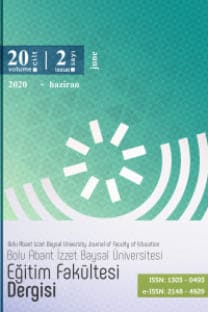Anahtar Kelimeler: Sosyal bilgiler, insan hakları, yurttaşlık, demokrasi. THE VIEWS OF CLASS TEACHERS ON THE INCORPORATION OF HUMAN RIGHTS, CITIZENSHIP AND DEMOCRACY COURSES IN THE CURRICULUM OF FOURTH GRADERS ABSTRACT
Anahtar Kelimeler: Sosyal bilgiler, insan hakları, yurttaşlık, demokrasi. THE VIEWS OF CLASS TEACHERS ON THE INCORPORATION OF HUMAN RIGHTS, CITIZENSHIP AND DEMOCRACY COURSES IN THE CURRICULUM OF FOURTH GRADERS ABSTRACT
___
- Akdağ, H. ve Taşkaya, M. S. (2011).Vatandaşlık ve insan hakları eğitiminin sosyal bilgiler öğretimindeki yeri. Sosyal bilgilerin temelleri, R. Turan ve K. Ulusoy (Ed), Ankara: PegemA Yayıncılık.
- Doğanay, A. (2004). Sosyal bilgiler eğitiminin genel amaçları ne olmalıdır? I. Sosyal Bilgiler Eğitimi Kongresi Bildirileri Kitabı. Ankara: Milli Eğitim Bakanlığı Yayınları.
- Duman, T., Karakaya, Y. ve Yavuz, N. (2001). Vatandaşlık bilgisi. Ankara: Gündüz Eğitim ve Yayıncılık.
- Elkatmış, M. (2013). 1998 vatandaşlık ve insan hakları eğitimi programı ile 2010 vatandaşlık ve demokrasi eğitimi programlarının karşılaştırılması. Ahi Evran Üniversitesi Kırşehir Eğitim Fakültesi Dergisi, 14 (3), 59-74.
- Er, H., Ünal, F. ve Özmen, C. (2013). 8. sınıf vatandaşlık ve demokrasi eğitimi dersinin 4. sınıfa alınmasına ilişkin görüşler üzerine bir araştırma. International Journal of Social Science, 6(8), 179-196.
- Gömleksiz, M. N. ve Kılınç H. H. (2013). Vatandaşlık ve demokrasi eğitimi dersi kazanımları ölçeğinin geçerlik ve güvenirlik çalışması. Turkish Studies, 8 (12), 555-568.
- Gürbüz, G. ve Gündüz, S. (2011). İlköğretim okulu öğrencilerinin demokrasi unsurları ile ilgili görüşleri: Bolu İli Gazipaşa İlköğretim Okulu Örneği. Turan Stratejik Araştırmalar Merkezi Dergisi, 3 (12), 17-30.
- Güven, S. (2011). Sosyal bilgiler dersinde vatandaşlık eğitimi ve vatandaşlık eğitiminde modeller. Sosyal bilgiler öğretiminde yeni yaklaşımlar ıı, R. Turan, ve H. Akdağ (Ed), Ankara: PegemA Yayıncılık.
- MEB, (2005). İlköğretim sosyal bilgiler dersi 6. Ve 7. sınıflar taslak öğretim programı, Ankara: Ders Kitapları Müdürlüğü Basımevi.
- McCowan, T. (2009). Rethinking citizenship education: a curriculum for participatory democracy, London: Continuum International Publishing Group.
- Miles, M. B. ve Huberman, A. M. (1994). An expanded source book qualitative data analysis. (Second Edition). Thousand Oaks, California: Sage Publications.
- Öztürk, C. (2009). Sosyal bilgiler: Toplumsal yaşama disiplinlerarası bir bakış. Sosyal bilgiler öğretimi, C. Öztürk (Ed.), Ankara: Pegem A Yayınları.
- Sadık, F. ve Sarı, M. (2012). Çocuk ve demokrasi: ilköğretim öğrencilerinin demokrasi algılarının metaforlar aracılığıyla incelenmesi. Uluslararası Cumhuriyet Eğitim Dergisi, 1 (1), 48-62.
- Tezgel, R. (2008). Yeni ilköğretim programlarında insan hakları vatandaşlık ve kentlilik eğitimi. Ankara: Araştırma Yayınları.
- Yıldırım, A. ve Şimşek, H. (1999). Sosyal bilimlerde nitel araştırma yöntemleri. Ankara: Seçkin Yayınevi.
- ISSN: 1303-0493
- Yayın Aralığı: 4
- Başlangıç: 2000
- Yayıncı: Abant İzzet Baysal Üniversitesi Eğitim Fakültesi
Bolu İlindeki Öğretmenlerin Ölçme Ve Değerlendirme Genel Yeterlilik Algılarının İncelenmesi
ÇOCUĞA YÖNELİK ANNE-BABA İLGİSİ ÖLÇEĞİNİN GELİŞTİRME ÇALIŞMASI
Hale SUCUOĞLU, Neşe ÖZKAL, Vesile YILDIZ DEMİRTAŞ, Cem Oktay GÜZELLER
Ahmet KÜÇÜK, Zeynel KABLAN, Sibel KAYA, Ayşe Arzu ARI
ÖĞRETMEN GÜDÜSEL DESTEĞİ ÖLÇEĞİ GELİŞTİRME VE UYARLAMA ÇALIŞMASI
Zeynel KABLAN, Sibel KAYA, Ayşe Arzu ARI, Ahmet KÜÇÜK
ULUSLARARASI ÖĞRENCİLERİN YAŞAM DURUMLARI: KIRKLARELİ VE TRAKYA ÜNİVERSİTELERİ ÖRNEĞİ* Gökhan ÖZKAN
Gökhan ÖZKAN, Meltem ACAR GÜVENDİR
ORTAOKUL ÖĞRENCİLERİNDE OKULA BAĞLANMANIN ÇEŞİTLİ DEĞİŞKENLER AÇISINDAN İNCELENMESİ
BOLU İLİNDEKİ ÖĞRETMENLERİN ÖLÇME VE DEĞERLENDİRME GENEL YETERLİLİK ALGILARININ İNCELENMESİ
